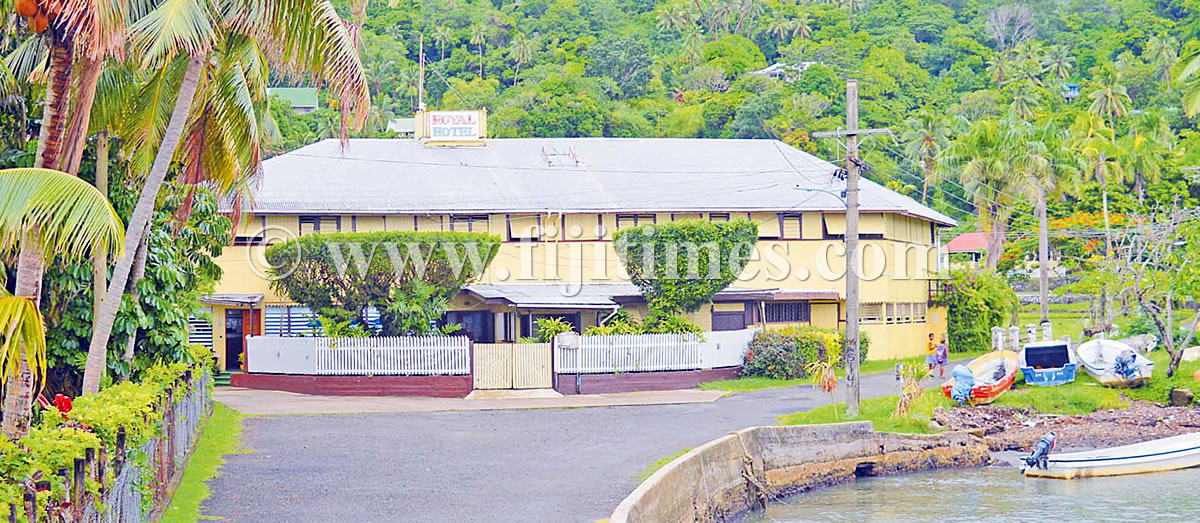IF setting foot on Beach St, Levuka, is a step back into the past, then staying at the Royal Hotel is the actual past.
From the odd-looking doorbell at the reception desk to the pixelated dressing mirror on the antique dresser, the Royal is a mini-museum in itself, loaded with memories of bygone eras and alive with stories of old Fiji.
Fiji’s oldest hotel is the only surviving establishment of its kind from the days when the old capital had an outrageous persona and when mariners found their way through the reef passage into Levuka Harbour by the trail of floating empty gin bottles.
Built-in 1852, the hotel was originally a wooden building, rebuilt in the early 1900s by Captain David Robbie. According to levuka.wordpress.com the earliest owners of the hotel were sea captains Volk and Robbie.
However, it was Captain Robbie who played an important role in the history of the Royal Hotel and the general early life of Levuka. He purchased the hotel from Captain Volk as a base for his tea export business.
This was during a time when Europeans rushed here hoping to make new money. He built a storage shed, especially for his popular tea that was planted and brought over from his plantation on Vanua Levu for export to markets of Europe. Among his popular products was the tea brand “Masusu”.
He also planted produce such as copra, rubber, cocoa, vanilla and coffee. The building still stands on the hotel grounds to this day, though is now used for accommodation. During his ownership, a fire razed the building so Captain Robbie had to rebuild the hotel.
It was as if his bad luck was associated with fires. Captain was also instrumental in having the Levuka Town Hall built. After Captain Robbie exited, the next owner was Captain Kaad, a Danish copra merchant and business partner to Captain Robbie, followed them.
The hotel was then sold to Morris Hedstrom and Co. In 1940, the Ashley’s Eddie and Dorothy took the reins from Eddie’s father, who was running the establishment for Morris Hedstrom. Dorothy was just 21 years old. Dorothy and Eddie eventually purchased the hotel, and with the passing of her husband in 1978, she continued on, determined to keep their dream alive, which she did up until her death on May 5, 2004.
Levuka’s main hotel, the Royal, was established in 1852, and although destroyed by fire in the 1890s, Captain David Robbie rebuilt it in 1913. By the 1860s, ship’s masters, plantation owners, even the notorious blackbirder, Bully Hayes, frequented the Royal.
The Royal, Fiji’s represents the finest embodiment of Levuka’s colonial past. It is said its builders had sailing ships in mind when they first erected it. According to the Royal Hotel’s records, the front rooms overlooked the harbour so sea captains could keep a watchful eye on their anchored vessels.
The port and the passage could be monitored too from the crow’s nest on the roof, which still stands atop the Royal.
Levuka started developing as a trade hub from the 1830s it was a small whaling and beachcomber settlement.
Back then, the place was virtually lawless because it was a haven for escaped convicts, ship jumpers, debtors and other “ne’er-do-wells”.
By the 1860s, the Royal has established itself as the finest hotel in town and was the place to stay.
According to literature, Bully Hayes (William Henry Hayes) arrived in the Pacific in the mid- 1800s as a smuggler, illegal grog trader, swindler, gun runner and slave trader. He earned the
title of “Pirate”.
“Lovable rogue Bully sailed the seas and came to Banks Peninsula to leave his mark and his memory as a handsome devil,” says the website www.bullyhayes.co.nz
“A young teenage lass by the name of Helen Murray was persuaded to sail to Lyttelton with Bully on the pretence she would be joining a theatricalcompany in China. Bully had other ideas.
He was arrested for the abduction but talked his way out of trouble yet again a free man.”
The Levuka regular was eventually killed in 1877 by a disgruntled seaman and was buried at seas near the Marshall Islands.
The hotel had its moments of glory and also its share of hardships. Times were tough during the years after the war.
According to Ashley family records, during this trying period, “the hotel guest list might have extended to only three and the pub downstairs was only making 20 pence”.
But the Ashleys were determined to see those hard times through. The hotel has remained in the hands of Ashley family to date.



